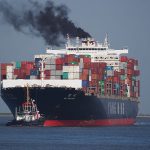Incoterms 2020 — What Is Changing from Incoterms 2010
 2020 is less than a month away, and it’s not an exaggeration to say it will be one of the most eventful new years the international shipping industry has ever seen. First, IMO 2020 goes into effect on January 1st, with its 0.5% sulfur cap on ships’ fuel. While we’ve covered IMO 2020 quite a bit in Universal Cargo’s blog, there’s a second big change being implemented on January 1st that we haven’t talked about.
2020 is less than a month away, and it’s not an exaggeration to say it will be one of the most eventful new years the international shipping industry has ever seen. First, IMO 2020 goes into effect on January 1st, with its 0.5% sulfur cap on ships’ fuel. While we’ve covered IMO 2020 quite a bit in Universal Cargo’s blog, there’s a second big change being implemented on January 1st that we haven’t talked about.
Incoterms 2020 go into effect on New Year’s Day.
Published by the International Chamber of Commerce (ICC) since 1936, Incoterms standardize international deals with terms or phrases that define who, whether seller or buyer, is responsible for the various portions of transportation and insurance of goods.
While the ICC could update Incoterms at any time, they tend to do so about every ten years. Incoterms 2020 is not a complete overhaul of the 2010 Incoterms we’ve come to know and love, but there are significant changes that we’ll share in this post.
At the end of the post, ICC’s current 2010 Incoterms and descriptions are reproduced with ICC’s permission. You can get even more details on the Incoterms as they currently stand by checking out a blog and video series we did on them:
What’s the Deal with Incoterms?
Incoterms Definitions Part 1: EXW, FCA, FAS, FOB
Incoterms Definitions Part 2: CFR, CIF, CPT, CIP
Incoterms Definitions Part 3: DAT, DAP, DDP
Here are the Incoterm changes the 2020 update brings.
2020 Incoterms Changes
FCA On-Board Bill of Lading for Sellers Option
This is a significant change happening with the 2020 Incoterms update as it pertains to the Bill of Lading, which is probably the most fundamental document when it comes to ocean freight shipping. For FCA, or Free Carrier, deals, the 2020 Incoterms update allows buyers to instruct carriers to issue a bill of lading with an on-board notation to sellers.
Normally, this document would not be issued to sellers in FCA deals. However, that was problematic because buyers sometimes need the document. For example, a bank may require the seller to present a bill of lading with the on-board notation to prove the goods have been delivered before the bank will release money to the seller from a deal that used a letter of credit.
DPU — Delivered at Place Unloaded
This might be the most obvious change in the 2020 Incoterms update because there’ll be a new name on the list of Incoterms while an old name disappears.
The Incoterm DAT is getting a name change. DAT stood for Delivered at Terminal. The problem with the Incoterm as it stood is that goods aren’t always delivered at the terminal. The seller and buyer may decide on a different delivery location. Therefore, the name is being changed to DPU — Delivered at Place Unloaded. Outside of the name change to better reflect all the deals it pertains to, the deal itself does not change, keeping the risk with the seller through the unloading of the goods.
CIP Insurance
The new Incoterms 2020 rules will require sellers to purchase a higher level of insurance in CIP, or Carriage and Insurance Paid to, deals. Previously, sellers were required to get the minimum level of coverage listed in Clause C of Institute Cargo Clauses; the 2020 Incoterms update will require sellers to purchase insurance of at least 110% as listed in Clause A of Institute Cargo Clauses.
This change is only for CIP deals. CIF — or Cost, Insurance and Freight — will not see a change in insurance requirements.
DIY Sellers
DIY stands for do-it-yourself. The 2020 Incoterms update recognizes that not all sellers ship through a third party. It is now explicitly stated within Incoterms that sellers may arrange for transportation themselves or they can, of course, contract third party delivery of goods, which it was traditionally assumed they would do.
Security and Customs
The language in the 2020 Incoterms update is more specific than it previously was regarding who pays and is responsible for customs clearance costs and risks. This isn’t the biggest change on who is responsible for customs, but it is more precise and should ensure everyone is clear on this point.
Also included in Incoterms 2020 is language covering security requirements, an area of ever increasing scrutiny when it comes to importing and exporting goods.
ICC’s Incoterms List & Descriptions
The following comes directly from the ICC, who sells books and products laying out all the details about Incoterms.
RULES FOR ANY MODE OR MODES OF TRANSPORT
- EXW – Ex Works
“Ex Works” means that the seller delivers when it places the goods at the disposal of the buyer at the seller’s premises or at another named place (i.e., works, factory, warehouse, etc.). The seller does not need to load the goods on any collecting vehicle, nor does it need to clear the goods for export, where such clearance is applicable.
- FCA – Free Carrier
“Free Carrier” means that the seller delivers the goods to the carrier or another person nominated by the buyer at the seller’s premises or another named place. The parties are well advised to specify as clearly as possible the point within the named place of delivery, as the risk passes to the buyer at that point.
- CPT – Carriage Paid to
“Carriage Paid To” means that the seller delivers the goods to the carrier or another person nominated by the seller at an agreed place (if any such place is agreed between parties) and that the seller must contract for and pay the costs of carriage necessary to bring the goods to the named place of destination.
- CIP – Carriage and Insurance Paid to
“Carriage and Insurance Paid to” means that the seller delivers the goods to the carrier or another person nominated by the seller at an agreed place (if any such place is agreed between parties) and that the seller must contract for and pay the costs of carriage necessary to bring the goods to the named place of destination. The seller also contracts for insurance cover against the buyer’s risk of loss of or damage to the goods during the carriage. The buyer should note that under CIP the seller is required to obtain insurance only on minimum cover. Should the buyer wish to have more insurance protection, it will need either to agree as much expressly with the seller or to make its own extra insurance arrangements.
- DAT – Delivered at Terminal (changing to DPU — Delivered at Place Unloaded)
“Delivered at Terminal” means that the seller delivers when the goods, once unloaded from the arriving means of transport, are placed at the disposal of the buyer at a named terminal at the named port or place of destination. “Terminal” includes a place, whether covered or not, such as a quay, warehouse, container yard or road, rail or air cargo terminal. The seller bears all risks involved in bringing the goods to and unloading them at the terminal at the named port or place of destination.
- DAP – Delivered at Place
“Delivered at Place” means that the seller delivers when the goods are placed at the disposal of the buyer on the arriving means of transport ready for unloading at the named place of destination. The seller bears all risks involved in bringing the goods to the named place.
- DDP – Delivered Duty Paid
“Delivered Duty Paid” means that the seller delivers the goods when the goods are placed at the disposal of the buyer, cleared for import on the arriving means of transport ready for unloading at the named place of destination. The seller bears all the costs and risks involved in bringing the goods to the place of destination and has an obligation to clear the goods not only for export but also for import, to pay any duty for both export and import and to carry out all customs formalities.
RULES FOR SEA AND INLAND WATERWAY TRANSPORT
- FAS – Free Alongside Ship
“Free Alongside Ship” means that the seller delivers when the goods are placed alongside the vessel (e.g., on a quay or a barge) nominated by the buyer at the named port of shipment. The risk of loss of or damage to the goods passes when the goods are alongside the ship, and the buyer bears all costs from that moment onwards.
- FOB – Free On Board
“Free On Board” means that the seller delivers the goods on board the vessel nominated by the buyer at the named port of shipment or procures the goods already so delivered. The risk of loss of or damage to the goods passes when the goods are on board the vessel, and the buyer bears all costs from that moment onwards.
- CFR – Cost and Freight
“Cost and Freight” means that the seller delivers the goods on board the vessel or procures the goods already so delivered. The risk of loss of or damage to the goods passes when the goods are on board the vessel. the seller must contract for and pay the costs and freight necessary to bring the goods to the named port of destination.
- CIF – Cost, Insurance and Freight
“Cost, Insurance and Freight” means that the seller delivers the goods on board the vessel or procures the goods already so delivered. The risk of loss of or damage to the goods passes when the goods are on board the vessel. The seller must contract for and pay the costs and freight necessary to bring the goods to the named port of destination. The seller also contracts for insurance cover against the buyer’s risk of loss of or damage to the goods during the carriage. The buyer should note that under CIF the seller is required to obtain insurance only on minimum cover. Should the buyer wish to have more insurance protection, it will need either to agree as much expressly with the seller or to make its own extra insurance arrangements.




